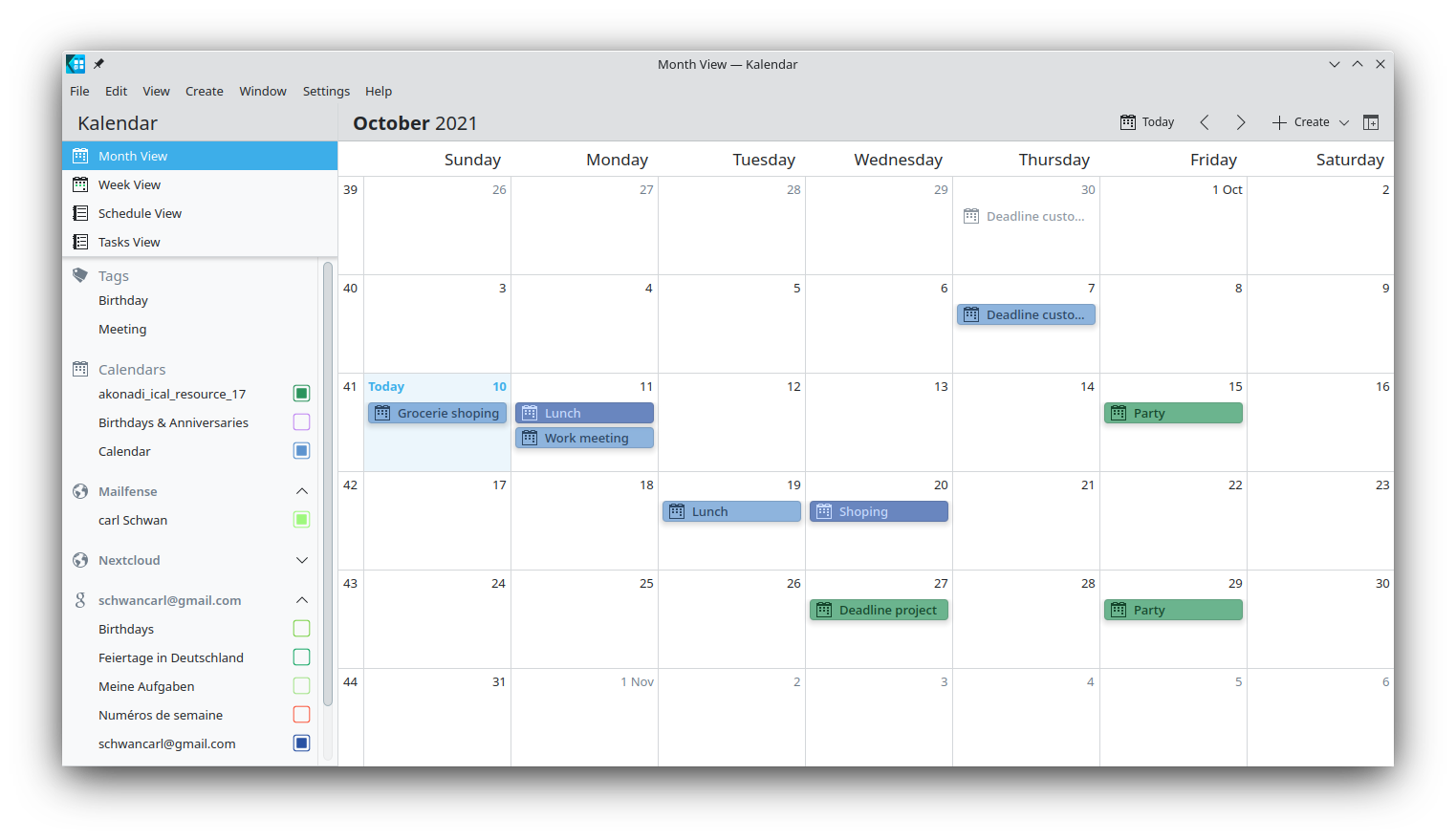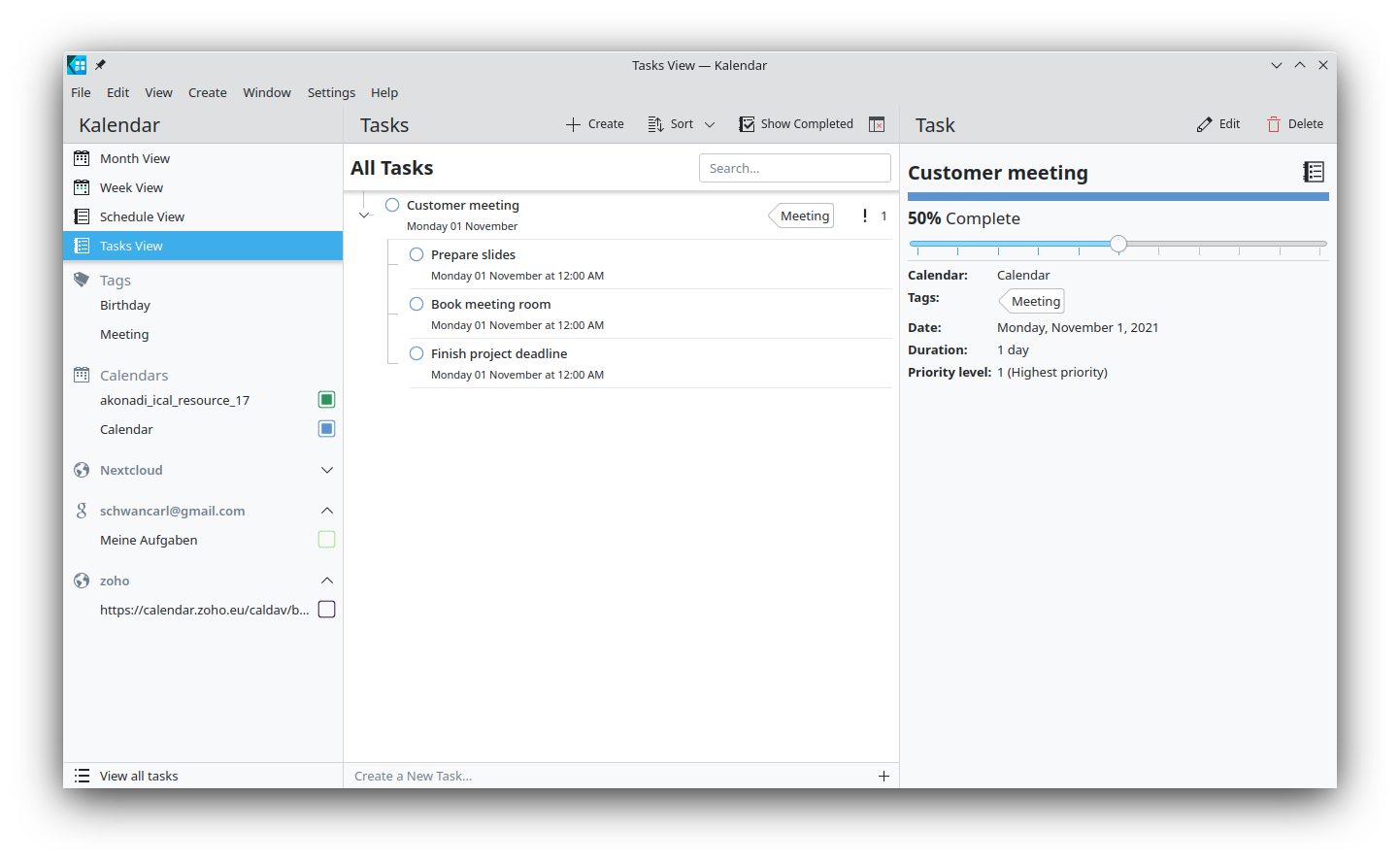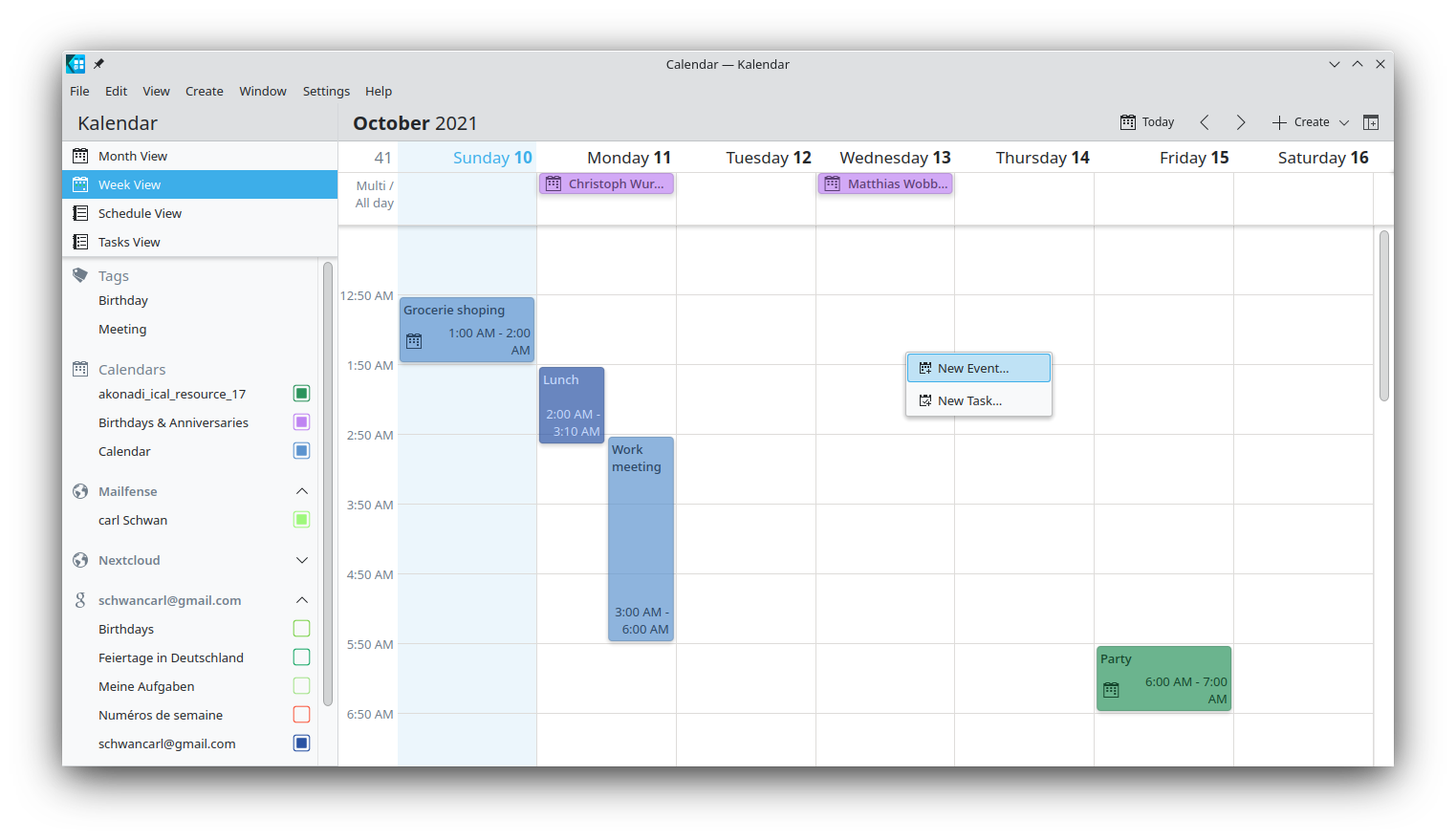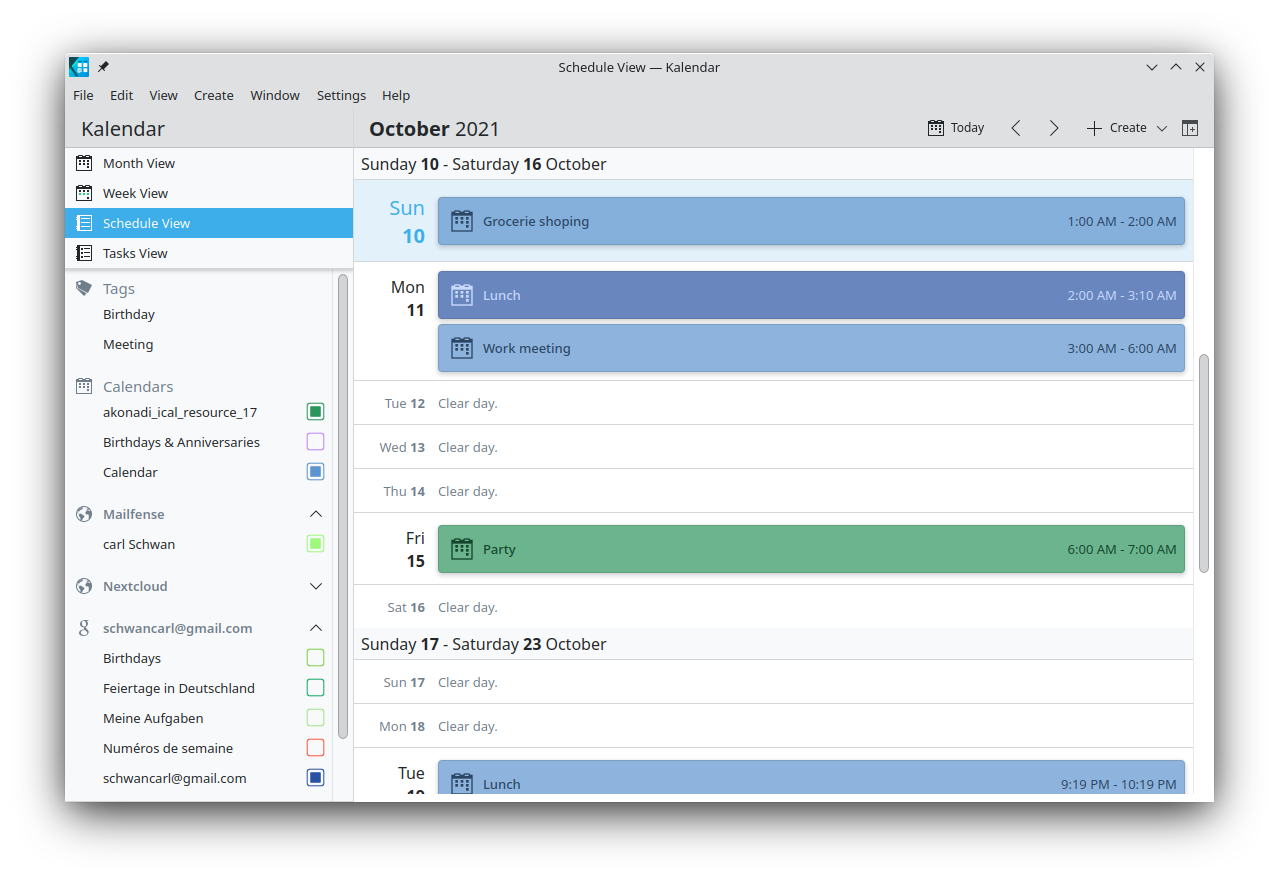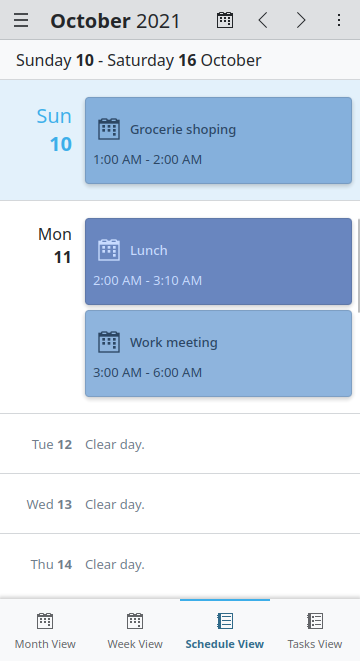Kalendar is a Kirigami-based calendar and task management application that uses Akonadi. It lets you add, edit and delete events and tasks from local and remote accounts of your choice, while keeping changes synchronised across your Plasma desktop or phone.
Get involved and join our Matrix channel: #kalendar:kde.org
Kalendar is available in the Arch AUR, in Fedora, and in openSUSE Tumbleweed using the following two OBS repositories: https://build.opensuse.org/project/show/home:KaratekHD:kirigami and https://build.opensuse.org/project/show/home:andresbs:plasma-mobile
Installation for Fedora
sudo dnf install kalendar
Kalendar requires KFrameworks 5.96 and version 22.08 of the KDE PIM-related dependencies (e.g. Akonadi, kdepim-runtime) to be installed. This package version is fairly recent and may not yet be available in your distribution of choice, meaning Kalendar might not work.
We also strongly recommend you install the kdepim-runtime package before starting Kalendar -- this will provide you with the ability to add calendars from online resources. Having this package will also let Kalendar's backend automatically create a default local calendar.
If you have already installed and started Kalendar and are now installing kdepim-runtime, make sure to run akonadictl restart; this will enable online resources and the local calendar after installing kdepim-runtime.
KDE Neon dependencies:
git cmake build-essential gettext extra-cmake-modules qtbase5-dev qtdeclarative5-dev libqt5svg5-dev qtquickcontrols2-5-dev qml-module-org-kde-kirigami2 kirigami2-dev libkf5i18n-dev gettext libkf5coreaddons-dev qml-module-qtquick-layouts qml-module-qtlocation qml-module-qt-labs-qmlmodels qtlocation5-dev qml-module-qtpositioning qtpositioning5-dev libkf5mime-dev libkf5calendarsupport-dev libkf5akonadicontact-dev libkf5akonadi-dev libkf5windowsystem-dev libkf5package-dev libkf5calendarcore-dev libkf5configwidgets-dev libkf5contacts-dev libkf5people-dev libkf5eventviews-dev libkf5notifications-dev libkf5qqc2desktopstyle-dev kdepim-runtime ninja-build
mkdir build && cd build
cmake .. -DCMAKE_INSTALL_PREFIX=~/.local/kde -GNinja
ninja
Yes. We support:
- CalDAV calendars (e.g. Nextcloud)
- Google calendars
- Exchange calendars
- iCal calendar files (.ics)
- iCal calendar folders
- Kolab groupware servers
- Open-Xchange groupware servers
Online event/task services such as Todoist that have non-standard implementations of calendars/task lists depend on someone taking the time to write code that adds support for the specific service in question. When (or if) that will happen will depend on how popular the service is, and on someone being willing to maintain support for said service.
Proton Calendar specifically is problematic, and it is impossible for us to support until Proton provides a way for us to interact and interface with the calendar (i.e. with the bridge application).
Yes. This can be configured by right-clicking on the digital clock -> Configure digital clock... -> Calendar -> enable PIM Events Plugin
This should reveal a new section in the widget settings, letting you configure which calendars' events will be visible in the widget.
Yes. It is what allows us to support all the services that we support, and provides the core functionality of Kalendar (fetching, editing, creating, and deleting events from remote resources).
While we’re actively working on reducing our number of external dependencies, these removals often take time and require reimplementing things in a new way, which is not always easy.
Other dependencies we require are there so we don’t bloat Kalendar by copying functionality that can be provided by an external package also used by other applications.
For the time being, no.
KOrganizer has an incredibly expansive feature set, which makes it a powerful tool for power users. Kalendar is instead focused on providing an approachable calendar for Plasma. You can expect great usability and a visually appealing interface that works on both desktop and mobile.
The intention is for the two apps to co-exist and for you to have the choice of using the one best suited to your needs. If you really need the advanced and expansive feature-set of KOrganizer, you will want to use that. If you want a versatile calendar application that is nice to use and you can comfortably use on your desktop and on your phone, Kalendar will fill that role well!
Yes, Kalendar is part of the org.kde.kontact flatpak. Please note that this package is missing some desktop integration features (e.g. the calendar applet plugin), and we generally recommend the use of the distro package if the version provided in the repositories is recent.
This is unfortunately out of our hands. If you'd like a Kalendar package on your distribution of choice, ask your distribution's packagers (nicely!) if they'd like to package Kalendar.
This project is licensed under GPL-3.0-or-later. Some files are licensed under more permissive licenses. New contributions are expected to be under the LGPL-2.1-or-later license.
